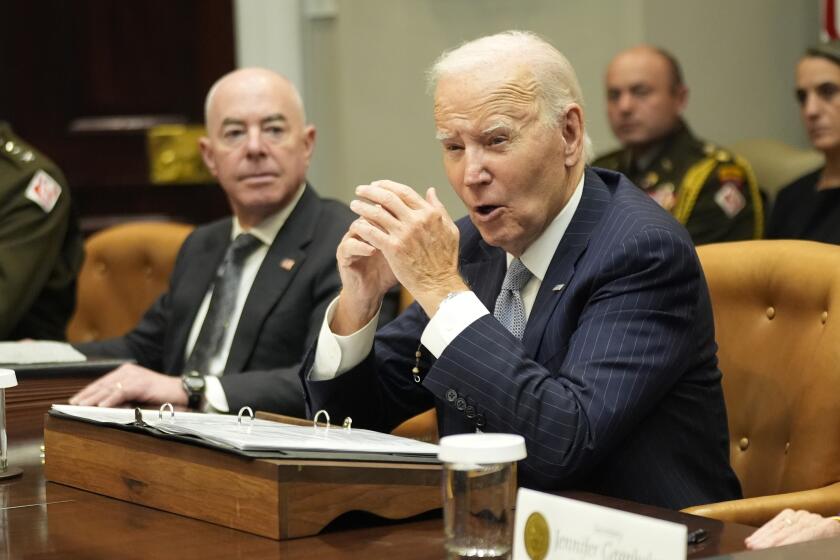Brazil Rate Cut Boosts Region’s Stock Markets
Latin American stock markets got a lift Wednesday from a surprise interest rate cut by Brazil’s central bank, but many experts say the next turn for the region’s markets--and economies--is more likely to depend on what happens in the United States.
The Brazilian central bank’s decision Tuesday to lower its benchmark overnight bank rate by a full point to 17.5%--a move hailed by economists as an act of confidence and sign of increased economic stability--sparked a 2.4% gain in Brazil’s main share index Wednesday.
Mexican stocks also strengthened, with the IPC index rising 2.5%.
But across the region the gains were more muted. Argentina’s Merval index rose just 0.2%, while Chile’s IPSA index added 0.3%.
Many Latin American investors, analysts say, are waiting to take their cue from the next round of U.S. economic reports, which should paint a clearer picture of how pronounced the U.S. slowdown has become.
Likewise, the U.S. Federal Reserve’s interest rate meeting next week will be closely watched by Latin investors. Another Fed increase, or a warning that the Fed may raise rates further later this year, could set a negative tone for Latin America’s outlook.
Roughly 80% of Mexican exports go to the United States. For Brazil the figure is about 22%. So any slowdown in U.S. demand could bite those economies.
“Good or bad news from the region has been shrugged off because the focus is more on what’s going to happen in the United States,” said PaineWebber analyst Siobhan Manning in New York.
“People are just kind of standing on the sidelines waiting to see what [Fed Chairman] Alan Greenspan will do,” said Walter Molano, of BCP Securities in Greenwich, Conn.
Latin stock markets tracked the U.S. Nasdaq index’s plunge in spring.
“Stocks have slid not because of local issues but because of uncertainties in the U.S. market. It’s difficult to have an emerging market going up when the largest capital market in the world is having difficulties,” said Renato Grandmont, a Deutsche Bank equity strategist in New York.
With Nasdaq’s rebound since late May, the Brazilian and Mexican markets also have resurged. The Bovespa stock index is up 27% since May 23. Mexico’s IPC index has risen as well, but not as sharply, in part because of worries over the July presidential election.
Domestically, the Brazilian central bank’s rate move is good news for the economy, which continues to recover from the 1999 currency devaluation and recession, and is beating targets for lowering inflation and shrinking fiscal and trade deficits.
Brazil’s inflation target of 6% this year is “well within reach,” said Larry Goodman, analyst at Globalecon advisory firm in New York.
Brazil has weathered several external shocks this year. A net energy importer, it has been hit by rising oil prices, economic problems in close trading partner Argentina, and rising U.S. rates.
The latest Brazilian rate cut--to the lowest level since 1994--is seen as having multiple purposes, including to boost exports. Lower rates make the country’s currency a less attractive financial investment but can also lead to “higher growth generated by Brazilian companies involved in export businesses,” Goodman said.
By reducing the cost of credit, the move is expected to increase Brazilian economic activity while cutting government deficits by lowering debt costs. Brazil’s spending deficit is expected to drop dramatically this year to as low as 3.4% of total economic output, down from a horrific 10% last year.
The risk in the rate move is that it could spark inflation by encouraging consumption, said Jose Carlos Faria, a strategist in Deutsche Bank’s Sao Paulo office. The nation’s currency could weaken sharply if further hikes in U.S. rates make investors see financial investments in the U.S. as more attractive than in Brazil and elsewhere in emerging markets.
Still, observers continue to sing the praises of Brazil’s central bank chief, Arminio Fraga, who since taking over in March 1999 in the aftermath of the currency devaluation has restored confidence, imposed transparency in the workings of the bank and “restored Brazilian access to capital markets,” Molano said.
(BEGIN TEXT OF INFOBOX / INFOGRAPHIC)
The Bovespa Battles Back
Brazil’s main stock index, the Bovespa, has soared since late May, helped largely by the rebound in the U.S. Nasdaq market. The market also got a lift on Wednesday as Brazil’s central bank cut its key interest rate to the lowest level since 1994.
Weekly closes and
latest for the
Bovespa index:Wednesday:
17,254.26
Source: Bloomberg News
More to Read
Sign up for Essential California
The most important California stories and recommendations in your inbox every morning.
You may occasionally receive promotional content from the Los Angeles Times.










